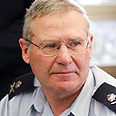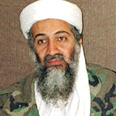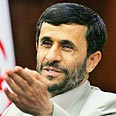
Intelligence chief Yadlin
Photo: Gil Yohanan

Nasrallah. Strengthened.
Photo: AP

Bin Laden. Who leads al-Qaeda?
Photo: Reuters

Number 1 threat: Ahmadinejad' nuke pursuit
Photo: Reuters
Strategic threats on Israel have increased in the past year, Israel's military intelligence chief, Major-General Amos Yadlin, assessed Tuesday during a speech at Haifa University entitled "Updated challenges in a changing world."
Yadlin counted seven main elements behind the turn for the worse. The prime reason was Iran’s determination to attain nuclear weapons and the fact that Tehran renewed research and development in the field. “Until recently, Europe had succeeded in freezing the continuation of Iranian nuclear development - for nearly 2.5 years,” he said.
General Yadlin noted that contrary to the positive atmosphere in Israel’s strategic environment between April 2002 and August 2005, the election of Iranian President Mahmoud Ahmadinejad and the continued research and development of nuclear technology in the Muslim nation were the chief reasons behind the turnaround, according to appraisals by the IDF’s intelligence wing.
Rocket Threat
Miri Chason
Prime minister tells World Zionist Congress in Jerusalem that Qassam rockets on communities bordering Gaza set to continue
Democracy legitimizes extremist leaders
Additional elements motivating the negative trends were the weakening of the American drive and the changes in the Middle East caused by events in Iraq. Another factor was the adoption of the democratic model, which now aids many extremist organizations to seize power positions and be legitimized in their countries – as happened with the Hizbullah in Lebanon, the Hamas in the Palestinian Authority and the Muslim Brotherhood which has gained strength in Egypt.
Yadlin noted Hamas’ rise to power and increasing faith in the success of Palestinian resistance through terrorism. Hizbullah Secretary General Hassan Nasrallah, Yadlin said, was the first to claim that by military force alone he would make Israel retreat from south Lebanon, with no diplomatic compromise. This trend was positively reinforced by Israel’s disengagement from the Gaza Strip, he sadi.
Yadlin added that owing to the West’s intense preoccupation in Iranian affairs, pressures on Syria and Hizbullah have waned.
An additional element Yadlin cited was the focus of World Islamic Jihad in the Middle East. Contrary to threats heard from al-Qaeda in the late ‘90s, when Israel was on a low place in the list of targets, recent rhetoric and activities emanating from Osama Bin Laden’s organization tend to frequently focus on Israel and the Middle East.
“In the meantime it has had a notable influence on the surroundings, such as the terror attacks in Taba, rocket fire from Aqaba, and fire on Lebanon – and not on Israel itself,” he said.
Rising fuel prices benefit Iran
The last element on the list was the rise in petrol prices. According to the general, when a barrel of oil cost USD 20, Iran was on the verge of bankruptcy, but now the price of a barrel is reaching USD 70, “and every dollar from every barrel of oil sold means another billion in Ahmadinejad’s budget.”
Regarding terror organizations, Major-General Yadlin said: “The terror organizations’ methods of education are impressive. They learn quickly, their research is excellent and their goal is to find their enemy’s weak point. One of the central challenges facing intelligence agencies today is to learn faster than they do.”
The intelligence chief said another challenge was identifying organization leaders preparing operations, when the group structures are “flat” and the leaders can be conspicuous. “Is Bin Laden the leader of al-Qaeda? Or is someone else? Not everyone calling himself al-Qaeda gets orders directly from Bin Laden. Orders to operate are in the spirit of things,” he said.
Yadlin added that the central activation channel of world Jihad organizations and al-Qaeda was the internet.















